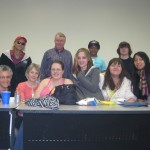Recently I asked my college success class to write an essay in response to the following prompt:
Many students are unsuccessful in college because they don’t see how college is going to help them create the life they want to live. Write an essay in which you define both what you want to accomplish in your life and how college is going to be an important steppingstone to that success.
I wanted to share one of my student’s essays that I found to be particularly moving:
Education is not the last chance but it is the path and the opportunity to enhance better existence for everyone. My adventure started in the Berkshires, an amazing place, with beautiful views and tender people. In 2008, I came from Mexico City. I decided to come to the USA to start a new and better life with my fiancé, Daniel. He is a generous and hardworking Mexican. In that same year, Dana, my first baby, was born and then my second girl Sophia in 2011. I have different roles in my life: a mom, a wife, a waitress, and now, a student. Even though there are many financial challenges in the journey, I believe that I have the courage to pursue my dream to become a nuclear engineer, create a better life for my family, and inspire my Latin community.
I am sure that learning will provide more opportunities to meet new people and improve how we do the things. Going to college is an option, an option for people who want to challenge their lives and have personal growth. Personally, I know that it will take some years, but I decided not to postpone and to start now. It is hard to manage the time to study, but every day I say to myself: I can push for a little extra. I reorganized my work schedule and home tasks to make time for my studies. I am certain that to succeed in life we need to focus on our goals. Finishing my college education is one of them. At the National University of Mexico (UNAM), I intended to get a degree in Physics, but financial difficulties and my pregnancy did not allow me to continue. In my soul, I always knew that I was emotionally ready to go back to school at any time. However, there were new challenges in the US: the language, the culture, no relatives, no job, and no friends. With hope in my heart, in 2009, I enrolled in ESOL classes. I worked hard to improve my English in the Adult Learning Program for three years. Finally, in 2013, I completed the Transition Class at BCC South County. This spring semester, 2014, I am taking English 060, BCC 101 and Project Link. For the fall semester, I have been approved to take MATH 145 and ENG 101, and I plan to major in Engineering and Engineering Technology. I want to become a legal resident of the USA and live here permanently.
I know that happiness is doing the things that you love, and it is much better if you receive remuneration for doing them. I like serving in the restaurant where I work but honestly, I do not want to perform this job forever. In the future, I would like to be remembered as a person who shared her life knowledge and as someone who challenged other people to aspire, particularly, Latino newcomers and students. I want also to teach my girls that whatever their dreams are, they can achieve them. I see myself in ten years working as an engineer, especially in the field of Nuclear Energy. I am going to enjoy my occupation with the people that are around me such, as my coworkers, family, friends, and the larger society.

